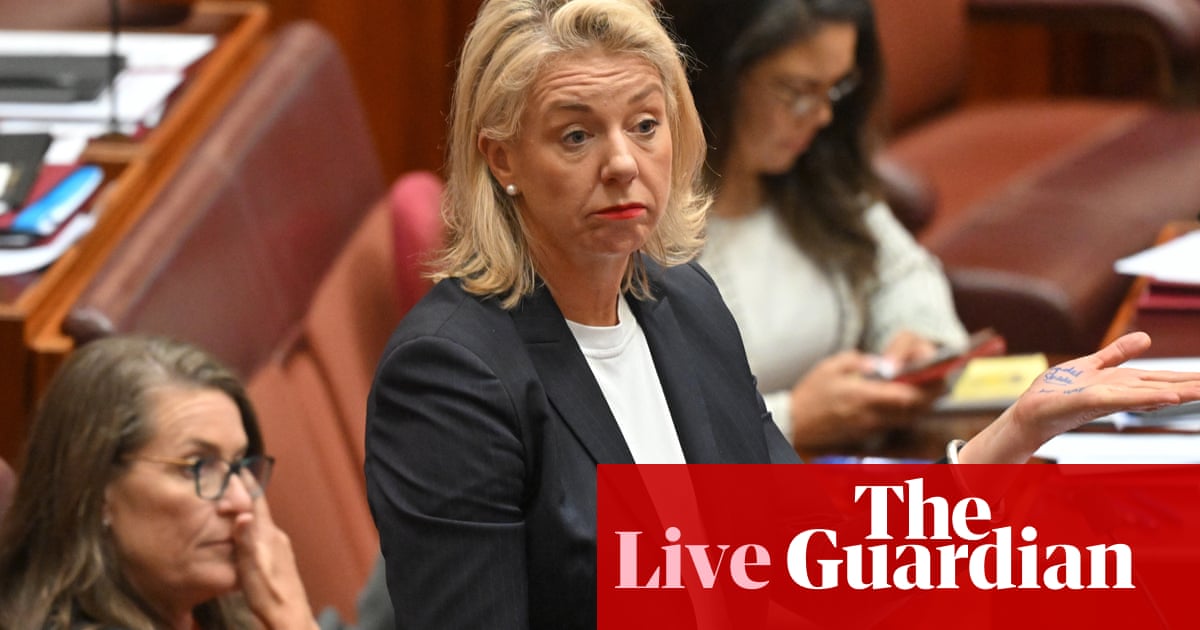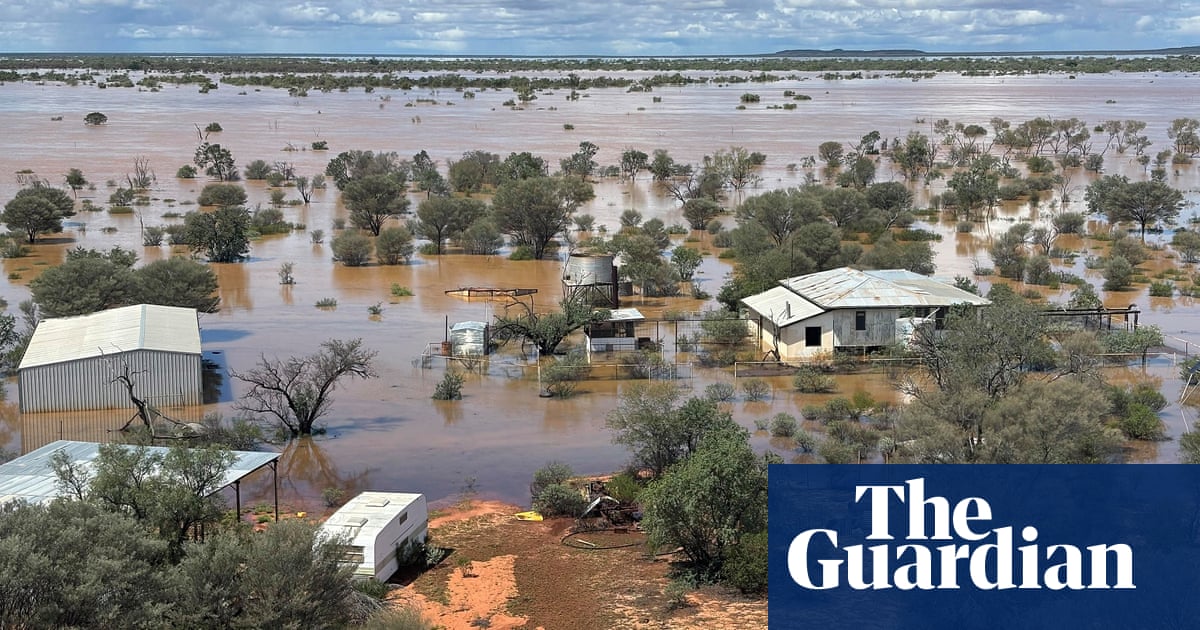Bridget McKenzie calls head of transport department an ‘inner-city lefty’

Cait Kelly
In the rural and regional affairs and transport estimates things have gotten heated over car emissions, with National party senator Bridget McKenzie accusing the head of the transport department of being an “inner-city lefty”.
McKenzie has been questioning if Labor’s proposed carbon emissions standard for carmakers will make them more expensive to buy. The automotive industry will soon become the biggest carbon polluter in the country.
The secretary of the department of infrastructure and transport, Jim Betts, said:
Only if there is absolutely no adaptation by the market in response to the new vehicle-efficiency standard, the whole purpose of which is to engender adaptation in the market, so Australians are no longer forced to have highly fuel-consumptive cars … Of course, the automobile industry don’t want to change, they’re happy dumping fuel-guzzling cars on Australians.
McKenzie:
Oh, Mr Betts, you have completely unmasked yourselves as an inner-city lefty today… Who will pay more, is everyday Australians, not for fuel-guzzling cars, the cars they need to drive because of the type of country we live in. I know the difference between a Hilux and an F-150.
Betts:
The reason why fuel-efficiency standards have been implemented in every OECD country, apart from Russia, without an impact on headline average car prices is because it’s consumer capitalism.
Automotives are very good at adapting to regulation, and they operate in a highly competitive market, and that will keep prices down, enable Australians to save money at the bowser and reduce emissions.

Key events
Treasurer Jim Chalmers earlier confirmed Labor wouldn’t be matching the Coalition’s pledge to halve the fuel excise.
Chalmers told Sky News the Coalition didn’t have a plan to lower the cost of living in an “enduring way”.
The Coalition doesn’t have any plans to help people with the cost of living in an enduring way and what it means is the economic policy that they will take to the election is higher taxes for every taxpayer, secret cuts to pay for nuclear reactors and no ongoing help with the cost of living.

Krishani Dhanji
Good afternoon,
We’re on the downhill slide to question time now, what will be (almost certainly) the last one for this parliamentary term.
Get excited!

Emily Wind
Many thanks for joining me on the blog today, I’ll hand over to Krishani Dhanji who will bring you all the latest from question time, Peter Dutton’s budget reply, and everything else happening in Canberra. Take care.
Local market slips as car tariffs fuel trade war fears
The Australian share market is on track to break a five-day winning streak, following US and European equities lower amid fresh jitters over White House trade policies.
AAP reports that the S&P/ASX200 had lost 40.1 points, or 0.5%, at lunchtime today, to 7958.9, while the broader All Ordinaries was down 47.5 points, or 0.6%, to 8177.6.
Building trade war tensions have already been dampening investor sentiment and the US president, Donald Trump, locking in a 25% tariff on imported (to the US) cars and light trucks from 2 April is set to deepen concerns.
In the domestic market, technology stocks were leading the march lower, down 1.9% at midday in line with losses across US heavyweights.
Six of the ASX200’s 11 sectors were down, with consumer discretionaries slipping 0.9% and financials sinking 0.8% after a better day of trade from the big banks.
Energy and mining sectors were bright spots, with BHP up 0.3% and Rio Tinto lifting a modest 0.1%. Fortescue had sunk 0.5%.
Discount store chain the The Reject Shop had more than doubled today as Canadian retail giant Dollarama moved to snap up the business for $259m.
Bandt says PM should not be inviting Trump to Australia
Yesterday, Anthony Albanese said he had extended an invitation to US president Donald Trump to visit Australia.
The PM told the ABC’s Afternoon Briefing he would also plan to visit the US if re-elected:
I have discussed with the president going to the US and I expect that certainly will be very early on in the term.
In a post to X this afternoon, the Greens leader Adam Bandt argued that the invitation should not have been extended:
The prime minister should not be inviting Trump to Australia. Trump is a danger to peace and a danger to democracy. He emboldens hate and hard-right ideology. We should be rethinking our relationship with Trump’s US, not sucking up to him.

Josh Taylor
NBN spent $5m in advertising at cricket, despite being wholesale provider with no direct consumers
The company responsible for the national broadband network, NBN, has spent $5m in advertising at the cricket, despite NBN itself being a wholesale provider with no direct consumers buying services from it.
The company revealed it spent $5m on a cricket partnership with Seven and Cricket Australia in response to an estimates question on notice from Greens senator Sarah Hanson Young.
The partnership includes access to Cricket Australia’s IP, including access to players, in-stadium signage and advertising on Channel 7.
Senators raised questions during Senate estimates hearings in February about the value of a wholesale company advertising to consumers, given that retail internet services providers on-sell NBN services to customers, rather than NBN itself.
NBN officials said it was the first campaign of its kind and argued it was more about raising awareness of the service amid upgrades being rolled out across the country.
NBN’s total advertising and media budget for 2024-2025 is $25.6m, with the majority of the expenditure going towards mailouts and other awareness campaigns informing customers if an upgrade or a service is available at their home.
Hanson-Young has buried dead fish from Senate stunt in her backyard
Sarah Hanson-Young, the Greens senator, has revealed the final resting place of the fish she used as part of her Senate stunt yesterday.
In case you missed it: the senator produced an apparently headless dead fish during question time after directing a question at Labor’s Jenny McAllister over legislation to protect the Tasmanian salmon industry.
Hanson Young said, “On the eve of an election, have you sold out your environmental credentials for a rotten, stinking extinction salmon?” before being asked to remove the fish from the chamber.
Hanson-Young told ABC Radio Adelaide:
It’s been buried in the backyard here in our place in Canberra. Hopefully it’ll give the lemon tree a good boost.

Caitlin Cassidy
Greens warn Dutton would be ‘disaster’ for public education amid flagged cuts
The Greens have warned a Peter Dutton government would be a “disaster” for public education and result in cuts to public schools, after media reports that the Coalition is planning to cut 40,000 public servant roles across education, health and other departments.
The Greens spokesperson for primary and secondary education, Senator Penny Allman-Payne, said:
A Dutton government would be a disaster for public education. The Liberals are fundamentally opposed to public schools – they’d prefer all schools to be fee-charging private schools. They don’t get that education is a right.
I think parents want fully funded public schools in their local area, with highly skilled teachers leading classrooms. The last thing you want to see is Peter Dutton standing at the whiteboard telling your kid what they can and can’t learn. Make no mistake, a Dutton government would see public schools suffer.
The shadow education minister, Senator Sarah Henderson, has indicated the Coalition would match Labor’s school funding agreements for public schools “dollar for dollar” but has raised concerns they contain “little in the way of specific reforms” to raise academic standards.
Bridget McKenzie calls head of transport department an ‘inner-city lefty’

Cait Kelly
In the rural and regional affairs and transport estimates things have gotten heated over car emissions, with National party senator Bridget McKenzie accusing the head of the transport department of being an “inner-city lefty”.
McKenzie has been questioning if Labor’s proposed carbon emissions standard for carmakers will make them more expensive to buy. The automotive industry will soon become the biggest carbon polluter in the country.
The secretary of the department of infrastructure and transport, Jim Betts, said:
Only if there is absolutely no adaptation by the market in response to the new vehicle-efficiency standard, the whole purpose of which is to engender adaptation in the market, so Australians are no longer forced to have highly fuel-consumptive cars … Of course, the automobile industry don’t want to change, they’re happy dumping fuel-guzzling cars on Australians.
McKenzie:
Oh, Mr Betts, you have completely unmasked yourselves as an inner-city lefty today… Who will pay more, is everyday Australians, not for fuel-guzzling cars, the cars they need to drive because of the type of country we live in. I know the difference between a Hilux and an F-150.
Betts:
The reason why fuel-efficiency standards have been implemented in every OECD country, apart from Russia, without an impact on headline average car prices is because it’s consumer capitalism.
Automotives are very good at adapting to regulation, and they operate in a highly competitive market, and that will keep prices down, enable Australians to save money at the bowser and reduce emissions.
PM’s ‘delulu with no solulu’ quip premiered on podcast

Caitlin Cassidy
If you missed it earlier, LiSTNR podcasters Lucy Jackson and Nikki Westcott have claimed the prime minister’s “delulu with no solulu” quip made in parliament towards the opposition yesterday.
The cutting critique was first made on their podcast, Happy Hour with Lucy & Nikki, in relation to Peter Dutton and his nuclear power costs.
“I dare you to drop that in a speech,” Jackson said, to which Albanese replied:
We’ve got budget next week, listen up … it’ll be a little in joke between the three of us and … the punters.
Now, the pair have released another video of the jovial interview, showing Albanese doing a strange sort of double wave over the backing track of the Grinch’s “what is up, my guy”.
Allow Instagram content?
This article includes content provided by Instagram. We ask for your permission before anything is loaded, as they may be using cookies and other technologies. To view this content, click ‘Allow and continue’.
This is politics in 2025 and I love it!

Henry Belot
Threatening letters sent to Hong Kong rebels in Australia being investigated by AFP and Asio taskforce
Government officials have confirmed anonymous letters sent to two exiled dissidents from Hong Kong are being investigated by the counter foreign interference taskforce, which is led by the domestic spy agency Asio and the federal police.
The letters, which were first reported by Guardian Australia, have targeted Melbourne based Kevin Yam and Adelaide based Ted Hui. Both are pro-democracy campaigners who have been accused of violating Hong Kong’s controversial national security laws by colluding with foreign powers to discuss sanctions.
The deputy secretary of the home affairs department, Nathan Smyth, said the letters were being taken very seriously.
Those matters are certainly the subject of the counter foreign interference taskforce’s activities.
Smyth told Senate estimates that Australia’s consul-general in Hong Kong has discussed the letters with government officials. He said he believed discussions were also had in Canberra.
We are deeply concerned. They are deeply worrying. If it is actual actions by a foreign state that would be clearly unacceptable to us and in breach of Australian laws. If it was a foreign government or a proxy of a foreign government, it would clearly be a breach of Australia’s foreign interference laws.
Major employers urged to hit gender equality targets
Employers will soon have to commit to achieve or make progress on gender equality targets in their workplaces after the federal parliament passed law changes.
As AAP reports, the changes apply to employers with more than 500 workers, meaning nearly 2,000 workplaces will need to meet the new standards – and 3.9m employees set to benefit.
Employers will be required to choose three gender equality targets such as intentional action to cover the gender pay gap, workforce and board composition, support for carers and parents, consultation and sexual harassment prevention.
They will then have three years to achieve or make progress on their selected targets. The Workplace Gender Equality Agency will publish each employer’s selected targets on its website, as well as their outcomes.
Employers that do not select, make progress on or achieve the targets will fail to comply with the new laws and may not be eligible to tender for certain commonwealth contracts. If they do not have a reasonable excuse they could also be publicly named.
Private sector employers will select their targets between 1 April and 31 May 2026, while commonwealth public sector employers will follow in September. This will give employers 12 months to understand the changes and choose their targets.
Home affairs secretary admits to using disappearing messages on Signal in work

Josh Taylor
The secretary of the home affairs department has admitted to using disappearing messages on Signal in her work, but says the department has strong record keeping rules surrounding the use of encrypted apps.
In response to questions about department use of Signal from the Greens senator David Shoebridge, home affairs officials in Senate estimates said there were robust policies in place around the use of Signal by staff in the department.
In addition to “general record keeping guidance” there was a specific policy for Signal, but the department’s chief operating officer, Charlotte Tressler, said there was no “prohibition” on disappearing messages in Signal but staff are told they must be “conscious of your record-keeping obligations, your FoI obligations, all of those things that are associated”.
The department secretary, Stefanie Foster, said it is up to each individual’s obligation to ensure they are keeping records. Then admitted she herself uses disappearing messages.
Shoebridge: “Do you use Signal?”
Foster: “I do, senator.”
Shoebridge: “Do you have disappearing messages?”
Foster: “I do in some cases, senator.”
Foster said she would need to check if she had disappearing messages turned on in her interactions with ministers. She said the circumstances she has disappearing messages on is for “purposes of that one might typically use a phone call for” such as setting up a meeting, but said she knows her record keeping obligations.
Foster also said she uses WhatsApp but could not say if those messages were set to disappearing.
Sussan Ley gives reply to Labor’s women’s budget statement
The deputy opposition leader, Sussan Ley, has been giving a reply to the government’s women’s budget statement in the House of Representatives.
She argued that women are worse off under Labor because “sadly it is women who face economic hardship at greater rates.”
I urge Labor to show me the women who are better off after three years of this government … We’ve seen violence against women increase and we’ve seen slow delivery of critical policies like the promised 500 domestic violence frontline workers …
Women have been the collateral damage to this government’s incompetence, because it is inevitably women who face the consequences most acutely of economic deterioration, and it is women who bear the horrific cost of violence in our communities.
Ley outlined a number of measures the Coalition would take if elected, including restoring the number of Medicare subsidised mental health sessions from 10 back to 20 and providing $4m to Ovarian Cancer Australia for specialist cancer nurses.
Doubts raised over Coalition’s fuel excise savings

Patrick Commins
The early mail from economists is that the average household won’t save anywhere near the claimed $14 a week from the Coalition’s plan to half fuel excise for 12 months.
Peter Dutton reckons his big cost of living measure – to rival Labor’s surprise tax cuts – will deliver twice that weekly benefit for a two-car family.
But AMP chief economist, Shane Oliver’s, somewhat more dispassionate calculations suggest the 25-cent fuel discount will save the average household about $8.75 a week.
Dutton this morning said their estimates were based on a household using 55 litres per week per car. Oliver, however, says ABS household expenditure data show the average household uses only about 35 litres of fuel a week.
That data is a few years old now, which means average fuel usage may be a little lower now given the increased popularity of EVs. Oliver said:
I would say $8.75 a week at most. But it will vary widely with those with no car or an EV getting no benefit and those with a RAM (ute) getting a big benefit.
Another simple calculation also suggests the Coalition’s claimed savings are overblown.
Spreading the $6bn across the roughly 10m households points to an average benefit of $600 a year. That’s about $11.50 a week.
For comparison, Labor’s recently passed tax cuts will give the average taxpayer an extra $4.60 a week from the middle of next year, and $9.20 a week from mid-2027.

Henry Belot
NRMA raises concerns about road funding under Coalition plan to fuel fuel tax
The NRMA has raised concerns about how the Coalition’s plan to reduce the fuel excise will impact funding for roads across the country.
The NRMA’s Peter Khoury welcomed the push to make fuel cheaper, but said he was looking forward to seeing more detail in Peter Dutton’s speech tonight:
There are some challenges that come with cutting the excise that I think we need to be realistic about addressing.
The excise isn’t really meant to be a lever that can be pulled for cost of living relief, even though we hope that is what will happen if [this change is introduced].
The excise is intended to fund road infrastructure. The federal government announced its budget this week. Not enough of that [excise revenue] is going into roads. We believe there is a small increase. About 78% of the excise has been committed to roads. It needs to be higher.
King on gender pay gap, rates of violence against women
Catherine King said that while it is narrowing, the gender pay gap “exists and it is persisting”.
[This is] a reflection of challenges related to care and flexibility, industry gender segregation and women’s under representation in senior roles … Women continue to carry the larger share of unpaid work, impacting on their long term financial security, including into our retirements.
King also said that rates of violence against women “remain unacceptably high”, outlining a number of investments the government has made to address this.
We haven’t just left it to one portfolio to address these issues, we are all in on this.
She said Australia has “one of the highest rates of workforce gender segregation amongst advanced economies”.
We know we need to address this to ensure the success of our future made in Australia agenda and the massive investments we are making in infrastructure across the country.










